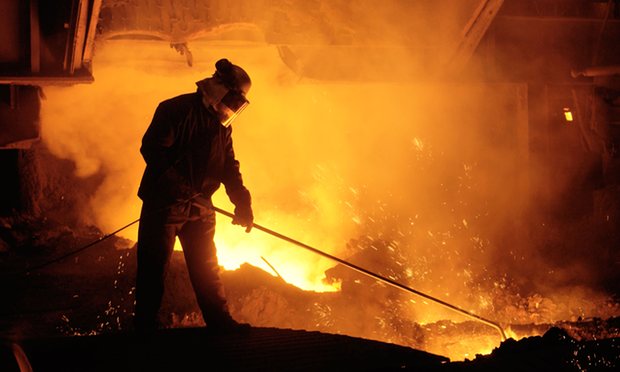The UK steel industry can be saved - Here’s how

In just six days the steel crisis has become the defining issue in British politics. Reputations, not just of individuals but whole institutions, from Cardiff through London to Brussels, are on the line. One government – the one in Edinburgh – has already passed the test with flying colours, with the world’s shortest ever nationalisation single-handedly saving the Scottish steel industry. UK and Welsh ministers – at opposite ends of the M4 and the political spectrum – have seemed sluggish in comparison. They now tell us they knew the writing was on the wall for weeks or months – in which case their inaction to date has been criminally complacent. This isn’t just a steel crisis, it’s a crisis of democracy, where the public’s trust in politics itself is now dangerously eroded.
For the time being the apportionment of blame can be left to the historians. It’s preventing steel itself from becoming history that has to be our focus now. Apart from closure, three competing solutions seem to be in the mix – sale to a private buyer, nationalisation and a union-backed management-and-employee buy-out. All three can be currently characterised by an enthusiasm deficit. There are private-sector buyers interested in the more profitable or least loss-making parts of Tata Steel’s UK estate, but not the searing heart of Port Talbot’s heavier end. The UK government says it won’t nationalise, and the Welsh government says it can’t. The unions are also understandably nervous about a mutualisation that would be on a scale never before seen in Britain. We are at something of an impasse, where no one is sure of what should happen next, apart from one cast-iron certainty: if we do nothing the steel industry will die.
In situations like this, perhaps the only option is to bind arms and jump together. But instead of the either/or binary of state v private sector solutions or even the third way of mutualism, why don’t we pursue a creative combination of all three? Any sustainable future for the British steel industry will almost certainly need the creative verve of someone like Sanjeev Gupta, who has already revived one Welsh steelworks and saved two others in Scotland. We need committed management with industry experience. Private involvement in turnaround situations like this is essential not so much for the private sector’s money as for their industrial and commercial skill. But we need their money – and the incentivisation that comes with it – to ensure their commitment.
The scale of the challenge, though, means that no private investor is likely to be willing to take on the entirety of the risk. We need other investors to bridge that gap, but this investment could come from a range of sources and take a multiplicity of forms. Tata’s environmental liability – which could run to as much as £1bn at Port Talbot alone – converted into an “exit dowry” could be reinvested by the Welsh government as an equity stake in a new joint venture company. The workforce could do the same, perhaps via Tata’s contribution to the pension fund deficit, trading accrued rights for employee shares. Local authorities could invest through the City Deal in a research and development centre for new hi-tech steels or the kind of process and business model innovation that Liberty Steel’s Gupta has promoted as a possible medium-term solution.
The UK government could also become a stakeholder, perhaps holding the heavy-end blast furnaces as a strategic asset – or, if its ideological aversion was too strong, simply providing very large, very long-term and very soft loans. If the EU even breathed a whiff of resistance to this rescue plan, it should be reminded that its reputation as an institution hangs in the balance too. Badging as much as possible of the government cash as green – for instance a new power station using the byproduct gases from production – or social – through a write-down of the accumulated liabilities of the old company – might avoid a state aid showdown. If the EU opts for neoliberalism over sensible industrial policy, it will find it has signed not just the steel industry’s death warrant, but its own.
The idea of a public-private-co-op joint venture – a triple alliance of government, investors and workers – is novel, though it draws upon ideas of Rudolf Meidner, the visionary pragmatist whose ideas helped shape Swedish success stories from the welfare state to Volvo. In a country with deeper ideological trenches this kind of approach will take a little time to work out, which is why an interim solution to “keep the lights on” is crucial. Conservatives worried about the “n” word should see this more as a case of public stewardship of a vital national resource, more Burkean than Bolshevik. The Welsh government too has to prove itself an active partner in saving Welsh steel, not a pressure group. If either government fails to rise to the level of events, then it’s not just steelworkers that will be declared redundant, but politics itself.